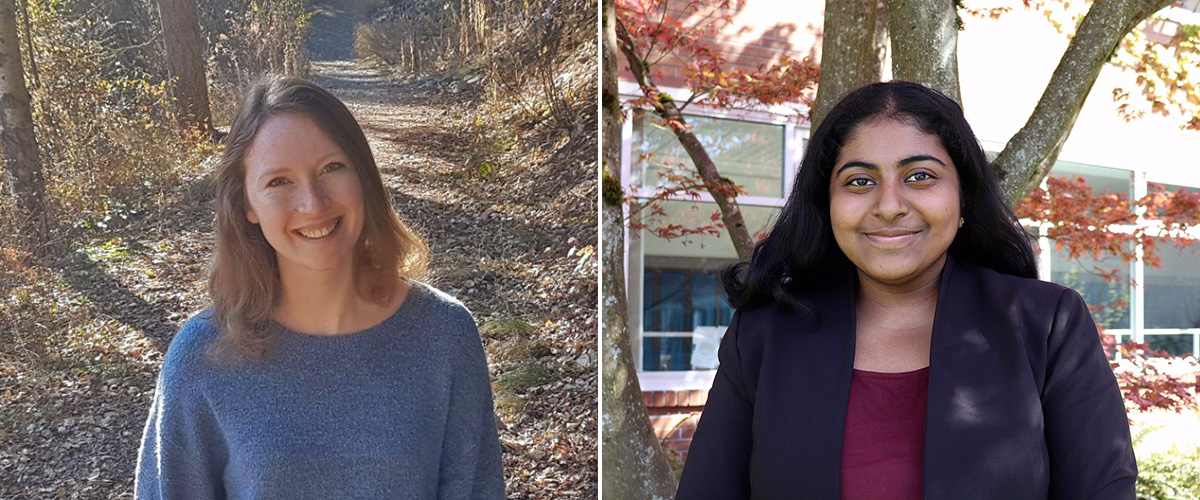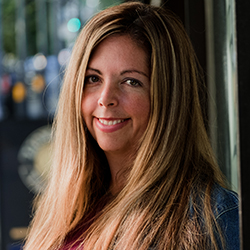New UBC initiative engages youth with lived experience to help inform mental health and substance use research

Rachel (left) and Jeanna, members of the Strategic Mental Health Research Youth and Family Advisory Council
At a young age, Rachel started showing signs of obsessive-compulsive disorder. Then she was hit by waves of crippling anxiety and depression.
“It was always changing and evolving,” she says. “The time I needed help the most was during high school.”
Familiar with the challenges and the courage it takes to reach out and get help, Rachel is now using her own mental health experience to help others as part of a new UBC initiative, known as the Strategic Mental Health Research Youth and Family Advisory Council.
Together with a team of youth from across British Columbia, Rachel is collaborating with UBC researchers to help guide and translate research on youth mental health and substance use during the COVID-19 pandemic.
“It’s empowering to have our voices at the table, ensuring research is in the best interest of youth and is a true reflection of what youth from diverse backgrounds are going through right now,” says Rachel.
Before COVID-19, one in four young people in B.C. experienced mental health and/or substance use challenges. Emerging evidence suggests that more young people are seeking mental health support than ever before.
Addressing gaps through engagement

Skye Barbic, Assistant Professor, Department of Occupational Science and Occupational Therapy
Dr. Skye Barbic, assistant professor in UBC’s department of occupational science and occupational therapy, is leading the advisory council initiative, which got its start through a grant from the Faculty of Medicine’s Special COVID-19 Strategic Investment Fund.
Dr. Barbic says the new initiative—involving partnerships with 18 diverse faculty members from UBC’s Faculty of Medicine, School of Nursing and School of Social Work, as well as thought leaders from the BC SUPPORT Unit, BC Children’s Hospital, Foundry and B.C.’s Health Authorities—is an example of how increased engagement with youth and family members can help inform research, address gaps and make a lasting impact.
“This project creates the environment for the academic community to work together with youth and families to co-design research,” she says. “The collaboration is redefining mental health research, while building a foundation of knowledge that will potentially benefit all youth during the pandemic and beyond.”
“The collaboration is redefining mental health research, while building a foundation of knowledge that will potentially benefit all youth during the pandemic and beyond.”
Dr. Skye Barbic
The youth research advisory panel consists of a dynamic group of young people from diverse cultural and geographical backgrounds, including members who identify within Black, Indigenous and people of colour (BIPOC) community and people who identify within the LGBT2SQIA+ community. All members have lived experience and a passion to improve research and care. A family advisory panel has also been recently created.
Whether it’s creating a new app for youth or generating knowledge through surveys, researchers can work with the team to help develop and refine research questions, carve our priority areas and examine how best to engage youth.
The power of partnership
According to Jeanna, another member of youth research advisory panel, by including youth as partners, researchers will gain more accurate data which will help fill knowledge gaps, identify the needs of underrepresented groups, and give youth more power over their own narratives.
“We want to make sure that the data is collected and stored safely, that BIPOC people are represented and that their cultural needs are accounted for,” she says. “Everyone on our team is invested in making sure that the research is effective and successful.”
Jeanna also believes having youth as research partners is immeasurable, as they offer different perspectives and insight into mental health and substance use.
“Research can literally change the lives of young people,” she says. “By including youth in that process, we’re taking a significant step forward.”
If you are a UBC researcher and interested in learning more or collaborating with the Youth and Family Research Advisory Panel, email Dr. Skye Barbic at skye.barbic@ubc.ca.